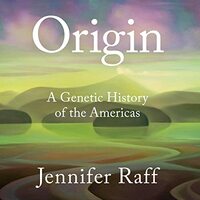Take a photo of a barcode or cover
i think this one was recommended in a youtube video from either Stephan Milo (most likely) or Milo Rossi (less likely) and was incredibly informative, a bit dry, which i suppose is expected, and occasionally difficult to understand between all of the dates, and i wish the sidebars were done differently (when im reading the physical book i can interpret a sentence to read a footnote, and then go back, but when listening the interruptions become very confusing)
It’s unconscionable that the fields of archeology and genetics don’t regularly work together, but here we are. Origin is a remarkably attuned and respectful read that plainly connects the genetics of the first peoples of the Americas and Caribbean. Most of the seems to be a “behind the veil” how-to-genetic and a proctor on culturally-sensitive genetics and archaeology. Although, on the whole, Origin offers thoughtful evidence of waves of multi-directional and modality migrations to what is now regarded as the Americas.
Full of information. I really wish she had lead the book with the discussion about tribal sovereignty, dna testing and pretensions, etc, rather than saving it for the end. I feel like that’s an important baseline to keep in mind throughout rather than introducing those concepts late in the game.
informative
reflective
medium-paced
informative
reflective
medium-paced
Very thoughtful and very thorough, with some absolutely fascinating parts. I definitely am glad I read it. I would have appreciated more handholding with the hard science, though, I know it was written for laypeople but I wish it was more so.
challenging
hopeful
informative
medium-paced
medium-paced
Really fascinating research, great point of view, not that well presented. Although I wanted to like this treatment of contemporary archaeological and genetic research into the peopling of the Americas more, I struggled with a few things. Organizationally, the book feels like the chapters were re-ordered about ten minutes before it was sent to the printer -- a section intro halfway through the book feels like it was the original intro. As a consequence, Raff fails to introduce new technical concepts as she talks about them, getting into the weeds of controversies before the reader is able to follow. Additionally, there aren't enough illustrations of complex theories, maps, or genetic relationships, which makes many of the arguments difficult to understand. And what illustrations there are are shockingly small, almost unreadable.
Still, if this is a topic of interest, I'd recommend it, in particular for the deeply sympathetic discussion of how indigenous peoples are and should be involved in invasive research into their ancestors and predecessors on the land.
Still, if this is a topic of interest, I'd recommend it, in particular for the deeply sympathetic discussion of how indigenous peoples are and should be involved in invasive research into their ancestors and predecessors on the land.





